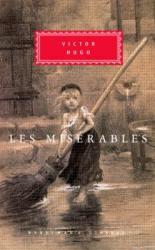Jean Valjean has been in prison for 19 years. On the day he is freed, he walks to the city of Digne, which is over thirty miles away. Exhausted, he searches for food and shelter, but is rejected at each place he goes to because he was a former convict. Finally he is told to ask the Bishop of Digne for help. The Bishop agrees without hesitation. Valjean wakes up early in the morning and steals the Bishop's silverware. He is caught and brought back to the Bishop, but the Bishop saves Valjean from returning to prison by pretending that the silverware was actually a gift. He even gives Valjean silver candlesticks as well. The Bishop convinces Valjean to turn around his life.
Exceptionally strong character development was a highlight for me. Some themes in this classic are sacrifice for others and unexpected generosity; for example, Valjean has an opportunity to shoot his worst enemy, but instead decides to free him. The plot also weaves the connections between characters magnificently. This book has made me experience emotions more strongly than any other book I've read.
Les Miserables is a relatively long novel; Victor Hugo (the author) is willing to become verbose frequently. I actually enjoyed its details, which made me more immersed in the story. If you don't usually read books with philosophy, it may take a little getting used to. Even if you have already watched the play, the book is still worth considering; there is plenty of extra material in the book that the play skips.



 Ruth Holley Library will be temporarily closed for approximately one week starting Mon., Dec. 2 to complete roof repairs.
Ruth Holley Library will be temporarily closed for approximately one week starting Mon., Dec. 2 to complete roof repairs.